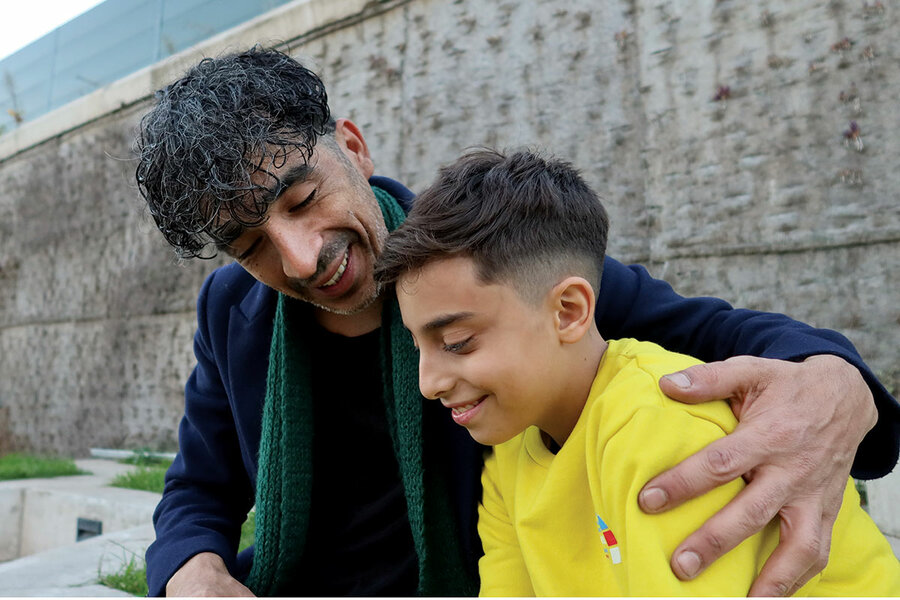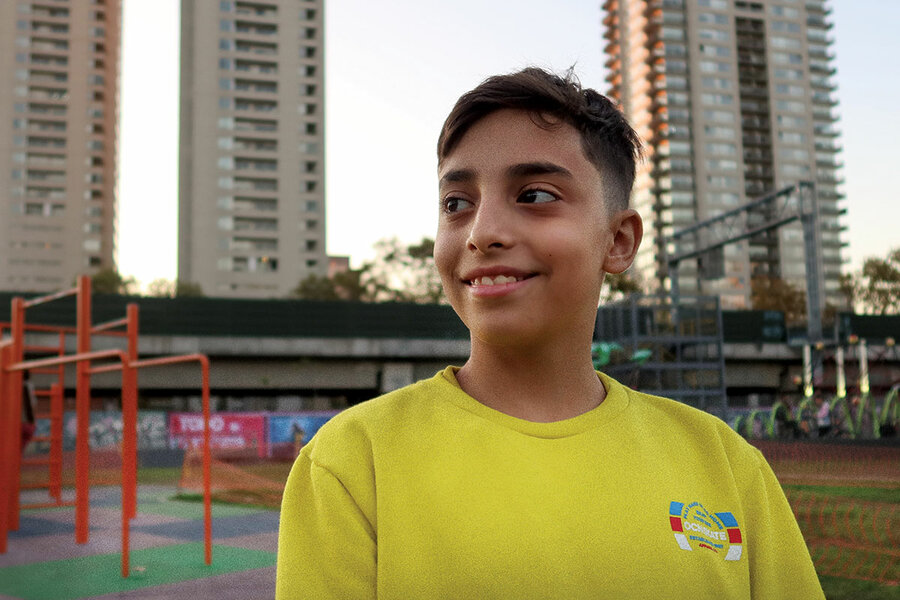Finding fatherhood in the square down the street
Loading...
| Buenos Aires, Argentina
This story is by Julio Franchi, as told to staff writer Erika Page.
I never thought I would be ready to be a father. When I realized she was handing him over to me, I didn’t think about my life. It’s never crossed my mind even a little bit to wonder what I’ve gotten myself into. I live alone in Buenos Aires; he is my family. Ian came to pull me out of myself, out of my ego. ...
Why We Wrote This
A story focused onNot everyone plans to become a parent. But when Julio Franchi met a boy in need of a father figure, his heart grew to meet the challenge.
... Fatherhood is like a giant mirror in which I see all my flaws. The virtues, too, although they aren’t as numerous. It forces me to try to be better, even if I don’t succeed all the time. ...
... That’s my guiding principle: honesty. When I told Ian the whole truth about what was happening to his mom – what it’s like to be an addict – everything became clearer to him. He began to understand that his mom had a problem. It wasn’t that she didn’t love him. It was essential for him to understand that. So that’s where I take shelter, in the truth.
This story is by Julio Franchi, as told to staff writer Erika Page.
At the time my only thought was to help. I just followed my instinct. Only now am I realizing what it means to be a father.
It was 2019. I would meet up with a group of neighbors and our dogs at the square around 10 o’clock at night. We were always the same people. One night a little boy appeared.
Why We Wrote This
A story focused onNot everyone plans to become a parent. But when Julio Franchi met a boy in need of a father figure, his heart grew to meet the challenge.
He was just there, playing with a stick, and you could tell he was alone. He looked abandoned. It was 11 o’clock, 12 o’clock at night. That was late for a 7-year-old. I asked him what his name was, what he was doing there. We got along right away. The next day he came back.
From then on he was always there, with his broken sneakers and clothes that weren’t his size.
We asked, and he wasn’t going to school. The first thing that occurred to us was to buy him some sneakers. We pooled money between the 10 of us neighbors.
I kept trying to connect the dots. I asked where he lived, and he said, “that way.” The next day I walked him to the corner. There were a few squatter houses left in the neighborhood – his was one of them. I went with him one day with the excuse of the new shoes. I didn’t want his mom to think I was meddling. When she came out I realized because of her state that she was dealing with an addiction. But she was receptive to help.
We found him a local school. That was already a lot. He could eat there and not spend so much time on the street. He would come to my apartment for an afternoon snack, or he’d go to one of the neighbors’ homes. This continued into 2020. We saw each other several times a week. He would ask to stay over at my house, but that didn’t happen at first.
Then the pandemic hit, and the pandemic was really strict here. You couldn’t go anywhere. Six months passed, and I didn’t hear anything from him. When the quarantine began to relax – right around when Maradona died, that’s what I remember – his mom called to say she was going to be hospitalized. She couldn’t take care of Ian.
She wanted to know if I could. I obviously said yes.
She never called to ask for Ian back.
She clearly loves her son. In her right mind, she’s great. Very fun, very cheerful. But the addiction leads her to lie endlessly. She can sleep for days. Later I learned that Ian had to get her out of places where he was forced to see really ugly situations. Within her chaos, though, she is always looking for the best for him.
I’m very individualistic. I’m always thinking about myself, always caught up in my own world. I never thought I would be ready to be a father. When I realized she was handing him over to me, I didn’t think about my life. It’s never crossed my mind even a little bit to wonder what I’ve gotten myself into. I live alone in Buenos Aires; he is my family. Ian came to pull me out of myself, out of my ego.
People who know me can’t believe I get up at 6 a.m. and take him to school. I used to go to bed at 7 in the morning or later. I’ve discovered the morning. I’ve discovered what it means to miss someone. The most important things in my life happen without me expecting them.
My relationship with my own father marked me. There are things that have been difficult for me to forgive, moments of violence from another generation. But he never threw in the towel. He always wanted to change. Now I see what it means to be a model for Ian. I can’t hit the brakes and say, “I’m not going to raise you for a while. I’m going to spend my time screwing everything up and doing things wrong, so don’t watch me.” He’s going to watch anyway.
Fatherhood is like a giant mirror in which I see all my flaws. The virtues, too, although they aren’t as numerous. It forces me to try to be better, even if I don’t succeed all the time. When I get angry, and I realize five minutes later I’ve made a mistake, I apologize right then. No matter how much I feel like screaming like a madman, I say, “Look, what I just said was wrong. I’m sorry.”
That’s my guiding principle: honesty. When I told Ian the whole truth about what was happening to his mom – what it’s like to be an addict – everything became clearer to him. He began to understand that his mom had a problem. It wasn’t that she didn’t love him. It was essential for him to understand that. So that’s where I take shelter, in the truth.
When I met him, knowing where he came from, the first thing I imagined was that I was going to bring him things, offer him experiences, buy him stuff. Not that I have any money. I’m a musician. I was better off than him, but just by a bit. But later I realized that in reality what I was going to give him were limits. That’s what he needed. That’s really being a parent.
At first we explained things to people about our relationship. Then at one point we said, “OK, that’s it, we’re father and son.” I told him, “Just watch, now that we say it, we’re going to start hearing that we look alike.” Two days later, a woman stopped us and said, “You’re identical!” Ian just started to laugh.
He talks like someone from Rosario, which is where I’m from. He’s never been there. He had the same sense of humor as my dad before meeting him. And there are things I’ve copied from him. He’s calm. He doesn’t talk so much. He listens. He observes. He eats so slowly, and I tell him that’s great. Eat slowly your whole life.
Once we were talking about how I found my dog Nino, how I found my cat, and he grabbed me and said, “You found all of us on the street!” I like the street. I feel good on the street. Life today feels as if it were on demand. Everything we do is already planned out, leaving no room for surprise. The street has something our phones don’t. There must be something there, because now I have a son.
Ian loves his mom. It’s more sadness he feels than anger, although there is anger too. If he can pull through all the inner turmoil – and he is going to – he’ll be free. I always tell him, “With all the pain around you, there are things you’ve gained that other kids don’t have.” He’s going to see that he is someone who has a story, and not just a traumatic one. It’s the life he was given. May he try to make it as beautiful as possible.








